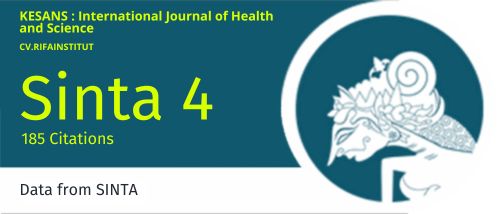Fertilization and Embryogenesis Success Rates in Patients with Polycystic Ovary Syndrome Undergoing In Vitro Fertilization
DOI:
https://doi.org/10.54543/kesans.v5i1.470Keywords:
Infertility, PCOS, In Vitro Fertilization, EmbryogenesisAbstract
Introduction: Infertility is a global health concern that affects individuals physically, emotionally, and socially. In women, ovulation dysfunction is a leading cause, most commonly related to Polycystic Ovary Syndrome (PCOS). Objective: This study aimed to assess fertilization and embryogenesis success rates in women with PCOS undergoing in vitro fertilization at the Morula IVF Clinic Jakarta between January and December 2024.Method: A descriptive study was conducted involving 66 patients who met the inclusion criteria. Data were obtained from medical records, including age, body mass index, antral follicle count, hormonal levels, and fertilization and embryo development outcomes at the cleavage and blastocyst stages. Result and Discussion: Most patients were under 35 years, with normal body mass index and hormone profiles. Fertilization success reached 100 percent for mature oocytes and 75 percent for those showing two pronuclei. Embryogenesis showed good quality in most cleavage and blastocyst stage embryos, while some demonstrated poor development, reflecting variations in embryo growth. Conclusion: Continuous monitoring of embryo morphology is essential to optimize embryo transfer decisions and improve in vitro fertilization success among women with Polycystic Ovary Syndrome
Downloads
Published
How to Cite
Issue
Section
Citation Check
License
Copyright (c) 2025 Batara Imanuel Sirait, Gracia Eunike, Silphia Novelyn, sri bintang elisabet

This work is licensed under a Creative Commons Attribution-ShareAlike 4.0 International License.





















